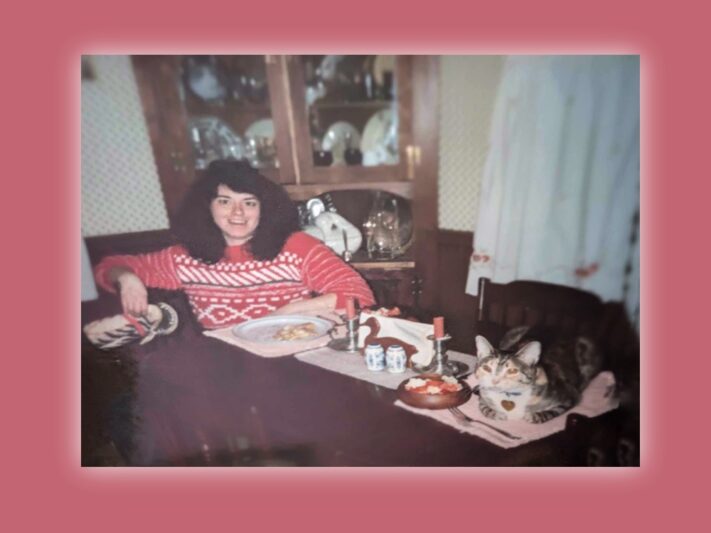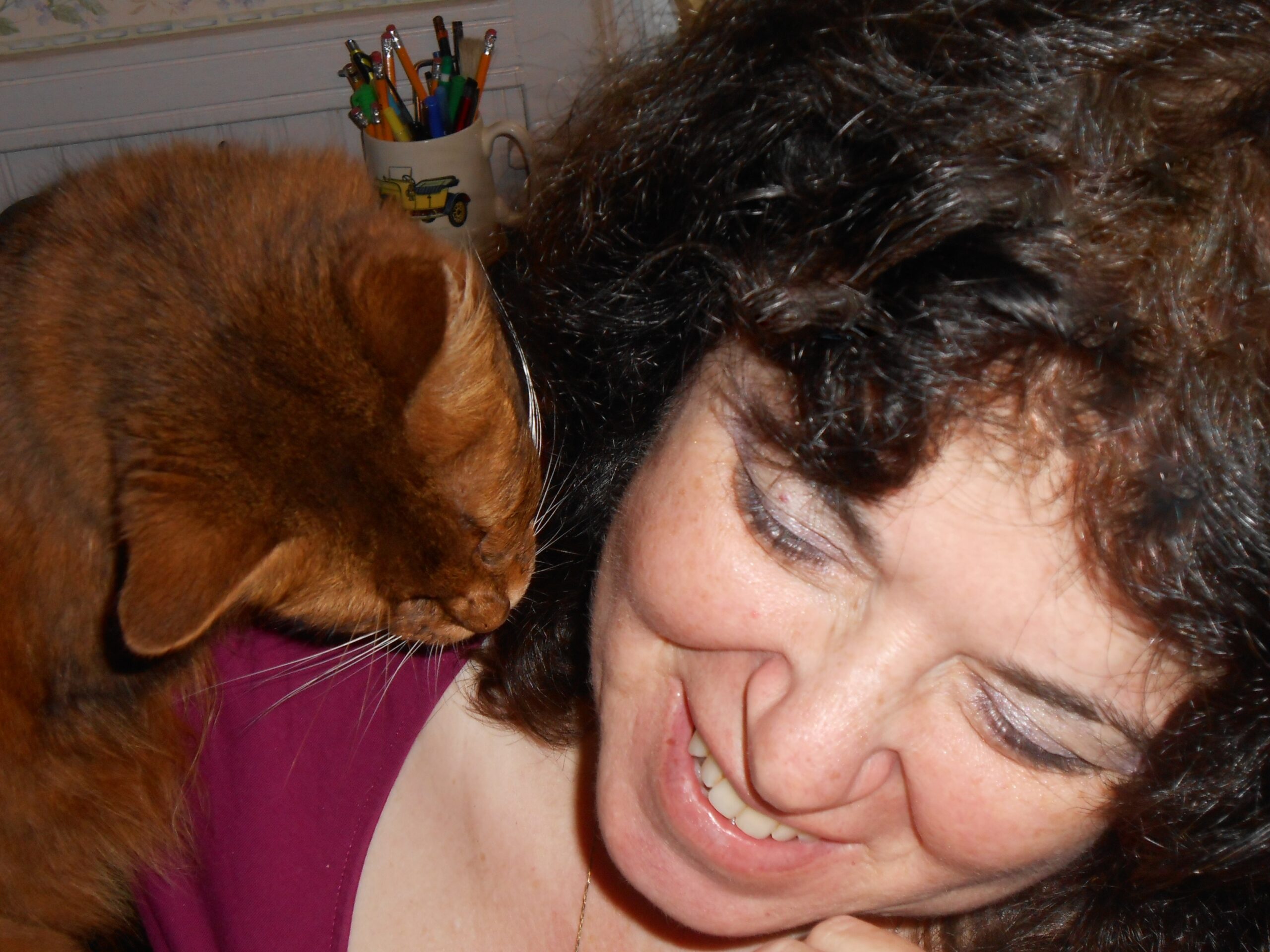By T. J. Banks.
Catsong didn’t start out as a book. It began as a single story – a long and loving good-bye to Kilah, a torbie barn kitten who, with her sister Cricket, had come to us shortly after Tim and I had married and moved into our new house.
Kilah was 16 when she developed cancer in one of her hind toes. The toe had to be amputated, but she came through surgery like the trooper she was, her striped tail waving proudly as she began accompanying me around the house again. Before the year was out, however, the cancer had returned. And because Kilah was a very old cat, she hadn’t many options left. None that my vet and I were willing to try, that is. There were many trips to the clinic, and each time, her luck held.
But I knew I couldn’t count on that. It was a slow-moving cancer, but eventually it would win. As I watched Kilah making more and more of an effort to get up and greet us, I thought about all her years with us. She’d been there through our marriage; our son Zeke’s birth; and Tim’s untimely death, followed a year to the day later by Cricket’s. Kilah’s connection with Tim had been especially strong: he had doted on her and joked about her “Kilahdeelian quality-of-life issues.” Losing her would be like losing him all over again.
So I began writing about her and this strange in-between-worlds place we were navigating. I wrote about the seemingly commonplace things, such as Kilah’s checking out all the utensils in the dishwasher to make sure there weren’t any choice morsels sticking to them or the running conversations she’d have with me in that Siamese-y voice of hers as she was eating. About how one morning, I suddenly turned around while I was painting the spare room and found her sitting there, quietly keeping me company as she always had. I wrote about these things partly because there’s beauty in the commonplace – “Sometimes the smallest things take up the most room in your heart,” A. A. Milne said – and partly because I wasn’t sure how many of these moments were left to us.

I wrote in the present tense because I wanted to keep us in the present tense as long as possible, even when it became clear that we were reaching that off ramp to the Rainbow Bridge. “I see Kilah as she is now, with that incredible love and serenity in her eyes,” I reflected, “and a line from Edgar Lee Master’s Spoon River Anthology – ‘Some beautiful soul that lived life strongly’ – comes to me, and I think how well it suits her.
“My old lady is going out in style. And with love.”
And then Kilah died. I left the story’s ending that way for a while; only later, when I was ready to, did I add to it, writing about her death and an inexplicable but very Kilahdeelian incident that occurred a few weeks afterwards.
A few years later, Jeremy Townsend of PublishingWorks and I began talking about bringing out a collection of my cat stories. So I put together what I felt were my best ones, somehow knowing that “Catsong” – the story of Kilah’s last hurrah – should be the title story. The book went on to win the 2007 Merial Human-Animal Bond Award. Years later, after PublishingWorks had closed up shop, I re-issued the book with additional stories, including one about Kilah in her younger, more vibrant days.
I’ve written a few other similar pieces over the years, and here’s what I would say to other writers who have lost or who are on the verge of losing a beloved cat companion: just write it all out, even if you go through boxes of tissues doing so. One, it will give you a way of expressing all those pent-up emotions. Two, you will have a record of your time together. Some day, once the wound has healed and only twinges in bad weather, you’ll re-read that story or poem, and all at once, he or she will come alive for you again. I know that’s how it has been for me. All I have to do is open Catsong, and Kilah is suddenly with me again. Writing has transformed the pain of losing that beautiful soul of a cat and given her back to me – quirks, purrs, and all.

T. J. Banks is the author of seven books, including ABYS AMONG US & OTHER STORIES FOR THE FELINE-INCLINED, CATSONG, and HOUDINI, which the late writer and activist Cleveland Amory enthusiastically branded “a winner.” A four-time Muse Medallion winner and winner of the 2007 Merial Human-Animal Bond Award for CATSONG, she has also received awards from BYLINE and THE WRITING SELF. Her work has been widely anthologized.
TJ, that is so moving and meaningful! Purrs to you as you as you remember your Kilah. I think writing is a wonderful way to keep the memories of our pets, with us. Indeed, I began writing my book about my cats partly in response to losses in the previous year. I felt the cats should be remembered as individuals the way humans are. I think blogging about them with pictures and anecdotes is a way of doing this too, but for me, there’s nothing like a book.
Thank you, Leah. Writing this blog post gave me a chance to re-live those early days with Tim, Kilah, and Cricket, and that felt like a real gift. I agree whole-heartedly with what you wrote about remembering cats “as individuals the way humans are,” whether it’s through writing, art, or both. These things bring a kind of healing with them.
That is so beautiful, and so true. And those personal stories are the ones that ring true to the reader as well.
Thank you, Andrea. I think of it as a kind of variation on what E. B. White once said about if you want to write about Man, write about a man — if you want to write about Cat, write about a cat. We find echoes of our own experiences in other people’s stories about their cats.
I love the idea of working through grief through writing (or other creativity).
Thanks, Mollie. It’s so important to find ways of expressing that grief, and writing about the cats who’ve graced our lives helps tremendously.
Love this piece and love the book. Everyone comes to grief in a different way, and you made it comfort and work for you. Cat lovers like ourselves must face our pets’ demise over and over again, and it never gets any easier. Still, with books like yours and articles like this, we know we are not alone, and that helps. Thanks so much for this..
Thanks, Allia! Your words make me think of this quote by the late Irving Townsend: “We who choose to surround ourselves with lives even more temporary than our own live within a fragile circle, easily and often breached. Unable to accept its awful gaps, we still would have it no other way.” When we write about the loss of our beloved cats, we are expressing that grief, but we’re also celebrating their lives.
A very touching and relatable post. When I lost my soulmate cat, Jazz, I too wrote a book about his journey of life and death (and his afterlife). At one point, despite the intention of the book to help others with the grieving process after losing a pet, I realized I had not grieved myself. This made the writing extremely difficult and frustrating as I was not emotionally equipped to share his story.
Then, one day, it just happened. The floodgate of tears as I mourned his loss. The tears were heavy and went on for an endless amount of time. Eventually, I felt a presence on my shoulders, and I knew it was him. He was letting me know that even though he was not with me in the physical sense, he would always be in my heart, and that could never be taken away.
An enormous peace came over me and opened the door to fresh writing. Rather than lament his loss as I wrote, I reveled in enjoying all the wonderful memories he had left me with. It was quite cathartic and honestly, I felt his presence around me every step of the way after that.
It’s not always easy to write about pain and there is no timeline for when it should be done. The heart just knows when the time is right.
Thanks again for a great post and for giving me a moment to remember Jazz in that special light again.
Warm Purrs – Deb Barnes (Purr Prints of the Heart – A Cat’s le of Life, Death, and Beyond)
Thanks for your kind words, Deb, and for sharing your experience with Jazz. I liked what you said about how “[i]t’s not always easy to write about pain and there is no timeline for when it should be done. The heart just knows when the time is right.” Some cats — the heart-and-soul cats — just take longer to write about.
Thanks for your kind words, Deb, and for sharing your experience with Jazz. I like what you wrote about how “[i]t’s not always easy to write about pain and there is no timeline for when it should be done. The heart just know when the time is right.” Sometimes, especially when you have elderly cats, there have been too many losses in a short amount of time. And with some cats — the heart-and-soul cats — it just takes longer to process the grief.
Such a beautiful story, told so poetically. The tissue box was out in paragraph two. : )
Thank you, Mewla. These stories can’t help being bittersweet — but, hopefully, the sweetness is what prevails.